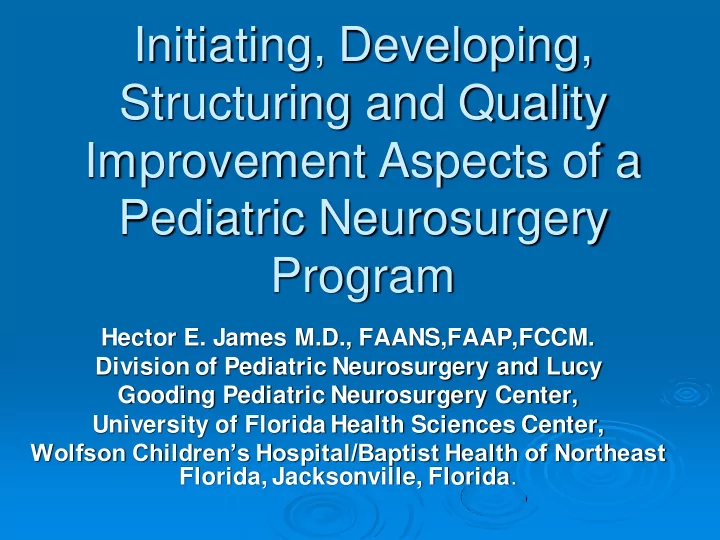

Initiating, Developing, Structuring and Quality Improvement Aspects of a Pediatric Neurosurgery Program Hector E. James M.D., FAANS,FAAP,FCCM. Division of Pediatric Neurosurgery and Lucy Gooding Pediatric Neurosurgery Center, University of Florida Health Sciences Center, Wolfson Children’s Hospital/Baptist Health of Northeast Florida, Jacksonville, Florida .
Quality Improvement Objectives for Pediatric Neurosurgery The Intraoperative care. The Preoperative care. The Postoperative care. The Comprehensive long term management of the child with a neurosurgical condition Management of parents and caretakers Transitioning the adolescent to an adult medical home
PLAN OF BATTLE Identify Community Resources. Identify Lack of Resources. Formulate a 5 year Work Template. Communicate with Professional Resources. Communicate with Administrative Resources. Access Venues of Financial Support
INTRODUCTION A comprehensive health care delivery system requires a sequential series of steps that provides a care strategy that starts with the initial contact of the child and caretakers, and maintains a longitudinal flow through diagnosis, medical/surgical management, rehabilitation, recovery and long term care. Such a system can only be made by a coherent organizational structure and dedicated professionally trained personnel .
CENTER DEVELOPMENT PHASE 1. CREATING A CLINICAL PROGRAM September 2003 – June 2010 Chief, Pediatric Neurosurgery Center PHASE 2. PROGRAM DEVELOPMENT & QUALITY IMPROVEMENT July 2010 – 2014 Director of Development of the Center
AN INTERDISCIPLINARY AND INTER-INSTITUTIONAL VENUE UNIVERSITY OF FLORIDA. MAYO CLINIC. NEMOURS CHILDRENS CLINIC. WOLFSON CHILDRENS HOSPITAL BAPTIST HEALTH OF NORTHEAST FLORIDA .
PHASE 1 Creating a Clinical Program INITIATING AN OPERATIVE SERVICE INITIATING AN INPATIENT SERVICE INITIATING AN OUTPATIENT SERVICE CREATING SUPPORT SERVICES CREATING CLINICAL PROGRAMS MAXIMIZING COMMUNITY RESOURCES EDUCATING PHYSICIANS AND ALLIED HEALTH PERSONNEL
PROFESSIONAL RESOURCES PEDIATRIC NEUROSURGERY PEDIATRIC OFFICE STAFF PEDIATRIC NEUROSURGERY NEUROSURGEONS ALLIED HEALTH PEDIATRIC OPERATING ROOM NEUROLOGY/ STAFF EPILEPTOLOGY CHILD WITH A NEUROSURGICAL CONDITION PICU FACULTY NEURORADIOLOGY NEONATOLOGY PEDIATRIC FACULTY RADIOLOGY PEDIATRIC PEDIATRIC EMERGENCY ANESTHESIOLOGY PEDIATRIC MEDICINE PHYSICAL MEDICINE REHABILITATION
INPATIENT HEALTH CARE FACILITIES CHIILDREN’S HEALTHCARE FACILITY PICU NICU CHILD WITH PEDIATRIC OPERATING ROOM A EMERGENCY NEUROSURGICAL ENVIRONMENT DEPARTMENT CONDITION PEDIATRIC NEURO IMAGING REHABILITATION CAPABILITES UNIT NEUROPHSYOLOGY MONITORING
OUTPATIENT FACILITIES OUTPATIENT PEDIATRIC NEUROSURGERY CLINIC PRENATAL DIAGNOSIIS SPINAL DEFECTS CLINIC WORKING GROUP CHILD WITH A NEUROSURGICAL CONDITION NEUROSCIENCES CRANIOFACIAL COMPREHENSIVE CLINIC CLINIC NEURO- SPASTICITY ONCOLGY CLINIC CLINIC*
OPERATING ENVIRONMENT NEUROSURGERY TEAM RADIOSURGERY INTRAOPERATIVE FACILITIES IIMAGING CHILD WITH A NEUROSURGICAL CONDITION INTRAOPERATIVE INTRAOPERATIVE NEUROPHYSIOLOGY ANGIOGRAPHY
Child with a Neurosurgical Condition ENTRY POINT OFFICE/ NEURO CLINIC IMAGING POSTOP OPERATIVE NEURO NICU ONCOLOGY INTERVENTION/ IMAGING Chemotherapy PROCEDURE PROTON/LINAC PICU THERAPY INTERMEDIATE CARE/ ACUTE RADIOSURGERY REHABILITATION PHYSICAL MEDICINE & COMPREHENSIVE REHABILITATION CLINICS UNIT
Entry Point/Initial Contact Patient Service Representatives: - Intake - Registration Patient Service Coordinators: - Scheduling of Imaging and Diagnostic Procedures. Patient Surgery Schedulers: - Surgery and Related Procedures .
Evaluation by Health Care Personnel History and Physical Examination by Neurosurgery ARNP/Physician Assistant. “ Focused” Examination by Pediatric Neurosurgeon . Requesting of Additional Diagnostic Procedures, Consultations and/or Operative Scheduling.
Diagnostic Neurophysiology Electroencephalography (EEG) Video Monitoring EEG Electromyography/Nerve Conduction Laboratory Baclofen Trial Facility Continuous Epilepsy Monitoring Facility
Neurodiagnostic Technologies Cranial/Spinal Ultrasonography Radiography Cranial/Spinal Computed Tomography Cranial/Spinal Magnetic Resonance Imaging (MRI) Functional MRI/Tractography/Spectroscopy Cranial/Spinal Angiography Positron Emission Tomography Single Photon Emission Computed Tomography Magnetoencephalography (MEG)* (*) to be developed.
Operating Environment Operating Facility with Capacity and Support Systems Neurophysiology Monitoring Neuronavigational Equipment Operating Microscope with Neuronavigational Attachments Neuroendoscopy Technology Intraoperative Ultrasonography Intraoperative Computed Tomography Intraoperative Magnetic Resonance Intraoperative Angiography Surgical Laser Systems
Immediate Postoperative Management Post Anesthesia Care Unit (Recovery Room) Neonatal Intensive Care Unit Pediatric Intensive Care Unit Intermediate Care /Acute Rehabilitation Area Non Acute Inpatient Care Areas
Postoperative Management Support Systems Non Acute Inpatient Care Areas Continuous Epilepsy Surgery Recovery Area Inpatient Physical Medicine/Rehabilitation Area Outpatient Physical Medicine and Rehabilitation Facilities
Outpatient Neurosurgery Care Areas for Longitudinal Multidisciplinary Management Brain Tumor Clinic Craniofacial Clinic Neurosciences Clinic Spasticity Clinic Spinal Defects Clinic
NEUROSURGERYPROGRAMS Brachial Plexus Injury Program Craniofacial Program Epilepsy Program Fetal Diagnosis/Therapy Center Program Nervous System Tumor Program Spasticity Program Spinal Defects Program Telemedicine Program (State of Georgia – Children’s Medical Services )
Central Nervous System Tumor Management Programs Pediatric Oncology/Chemotherapy Regimes (Nemours Children’s Clinic) Radiosurgery: Gamma Knife Surgery – Novalis Tm (Baptist Health) LINAC Radiation Therapy (Baptist Health) Proton Beam Therapy (University of Florida)
PHASE 2 Program Development & Quality Improvement CME JOURNAL CORRECT CLUB AND/OR QI ENHANCE MONTHLY PROGRAMS SESSIONS QUALITY IMPROVEMENT MONTHLY SESSIONS
Program Development Ongoing Education/Quality Improvement QI/CME LOOP Identify Equipment Adverse Knowledge “Failure”/or Gap of Event T echnical Issue T eam Identification Member DOCUMENT QUALITY ACTION TAKEN CME/JOURNAL IMPROVEMENT IN QI CLUB SESSION SESSION PROCESS
PROGRAM DEVELOPMENT: A CONTINUING EXPERIENCE CENTER FACULTY ENHANCEMENT - Faculty Recruitment - Fellowship Application and Program TRAINING AND EDUCATION - Neurosurgery Residents - Neurology Residents and Fellows - Allied Health Personnel PROGRAM ENHANCEMENT VENUES - Center Pharmacology Venue - Center Bibliography Venue
PROGRAM DEVELOPMENT Clinical Research/Education CLINICAL RESEARCH FOR QI ISSUES CLINICAL RESEARCH FOR RESIDENT AND FELLOWSHIP TRAINING CLINICAL RESEARCH AS A VENUE FOR INTERDISCIPLINARY WORK CLINICAL RESEARCH AND RESOURCE UTILIZATION
PROGRAM DEVELOPMENT: RECRUITING COMMUNITY AND INSTITUTIONAL SUPPORT PROGRAM FINANCIAL SUPPORT PATIENT CARE FINANCIAL SUPPORT OPERATING ENVIRONMENT FINANCIAL SUPPORT FINANCIAL SUPPORT FOR CLINICAL PROGRAMS
What I Have Learned By involving the Physician Assistant and the Nurse Practitioners in the QI and CME monthly sessions, a better “team” venue and ongoing interaction with the physicians has been realized. Involving these “Physician Extenders” in education, clinical research, preparation of manuscripts and presentations in scientific meetings, a spirit of “providing better” patient care seems to have evolved.
ACKNOLEDGEMENT We wish to express our appreciation for the support received for the creation of the Pediatric Neurosurgery Service at the University of Florida and the Wolfson Children’s Hospital/Baptist Health by the Lucy Gooding Charitable Trust Foundation and the Baptist Foundation of Northeast Florida.
Recommend
More recommend